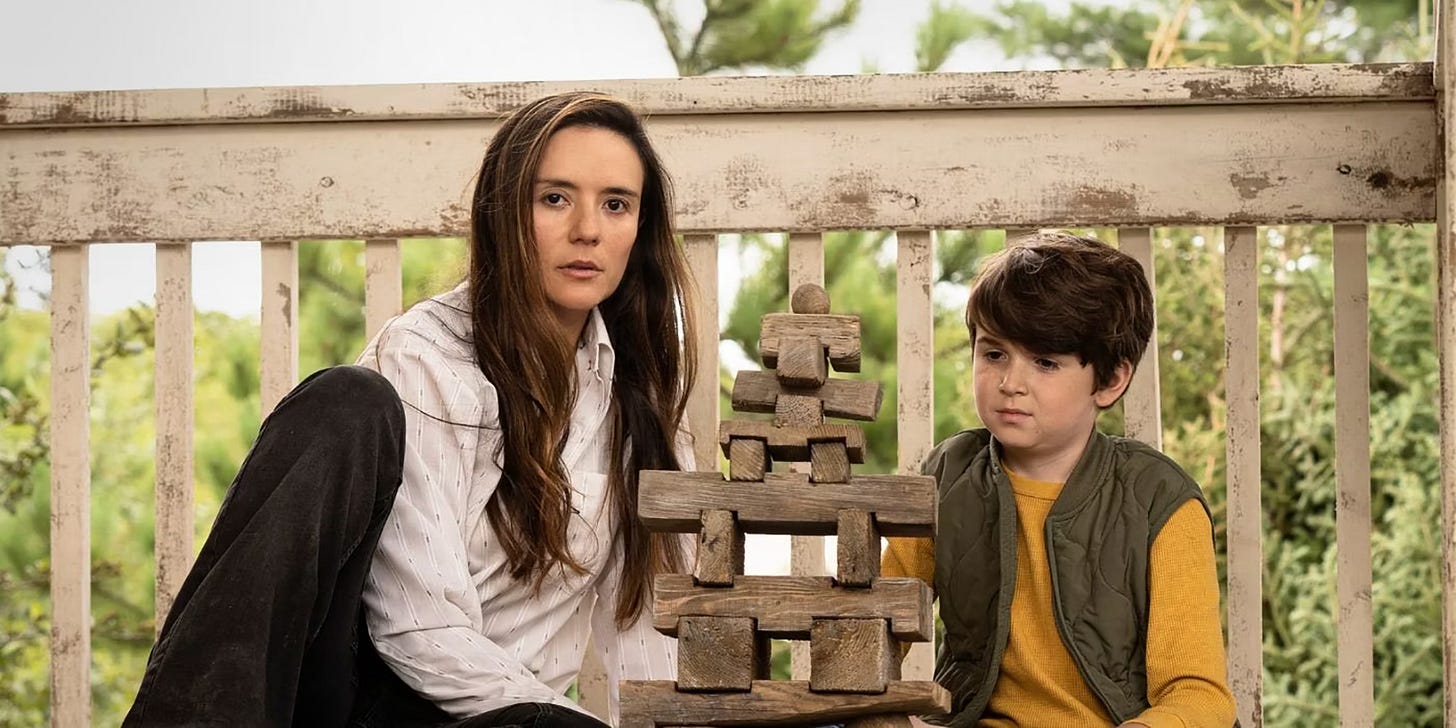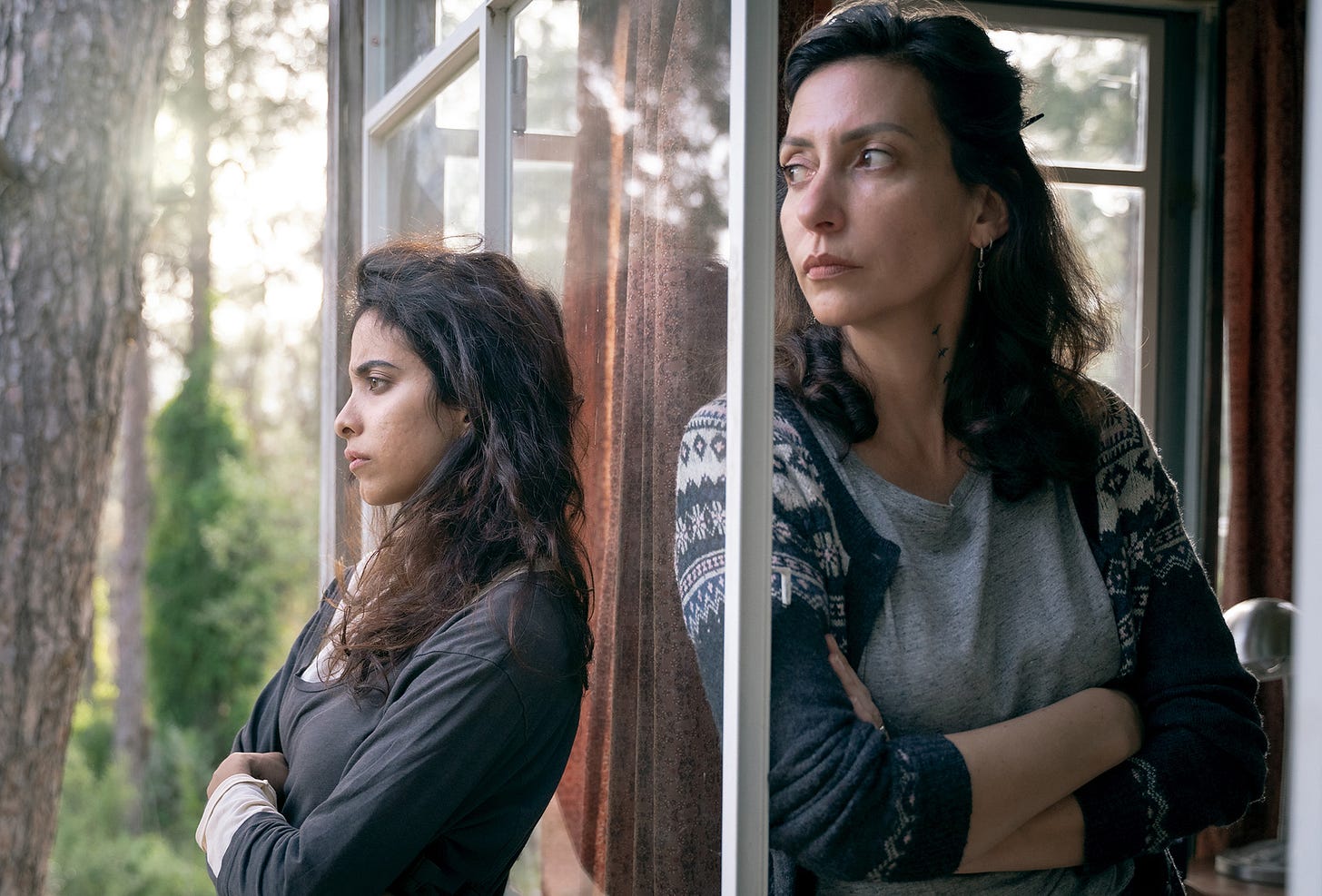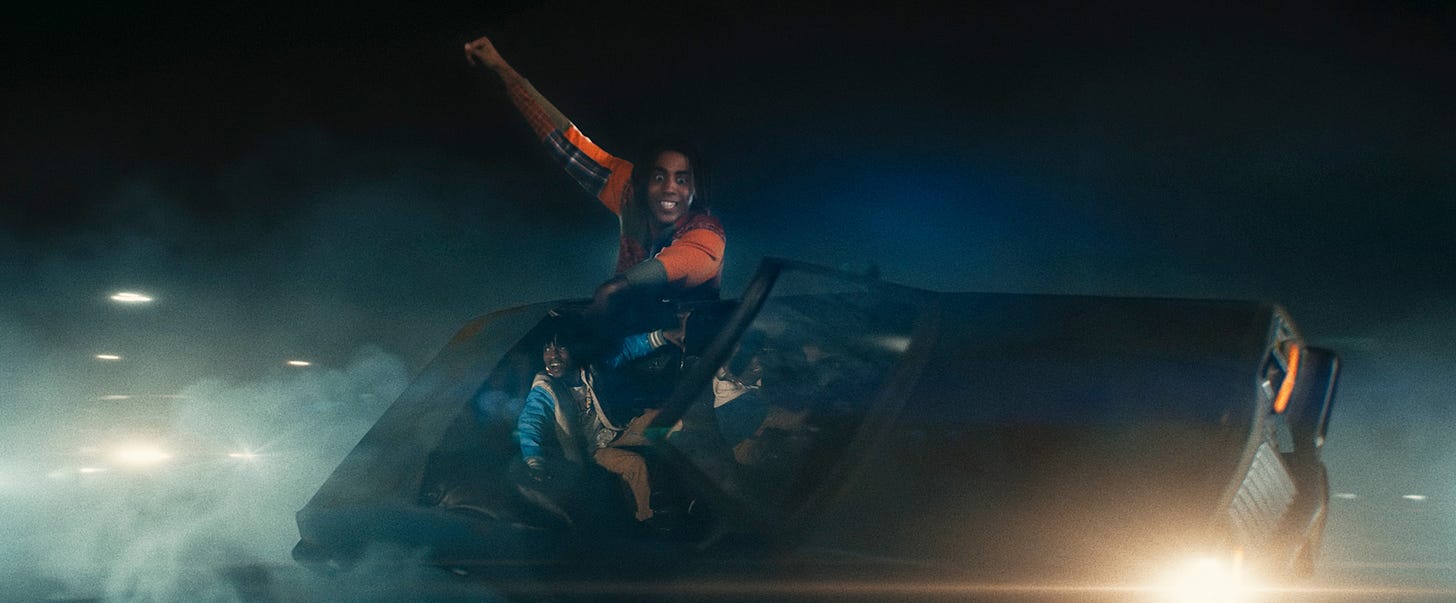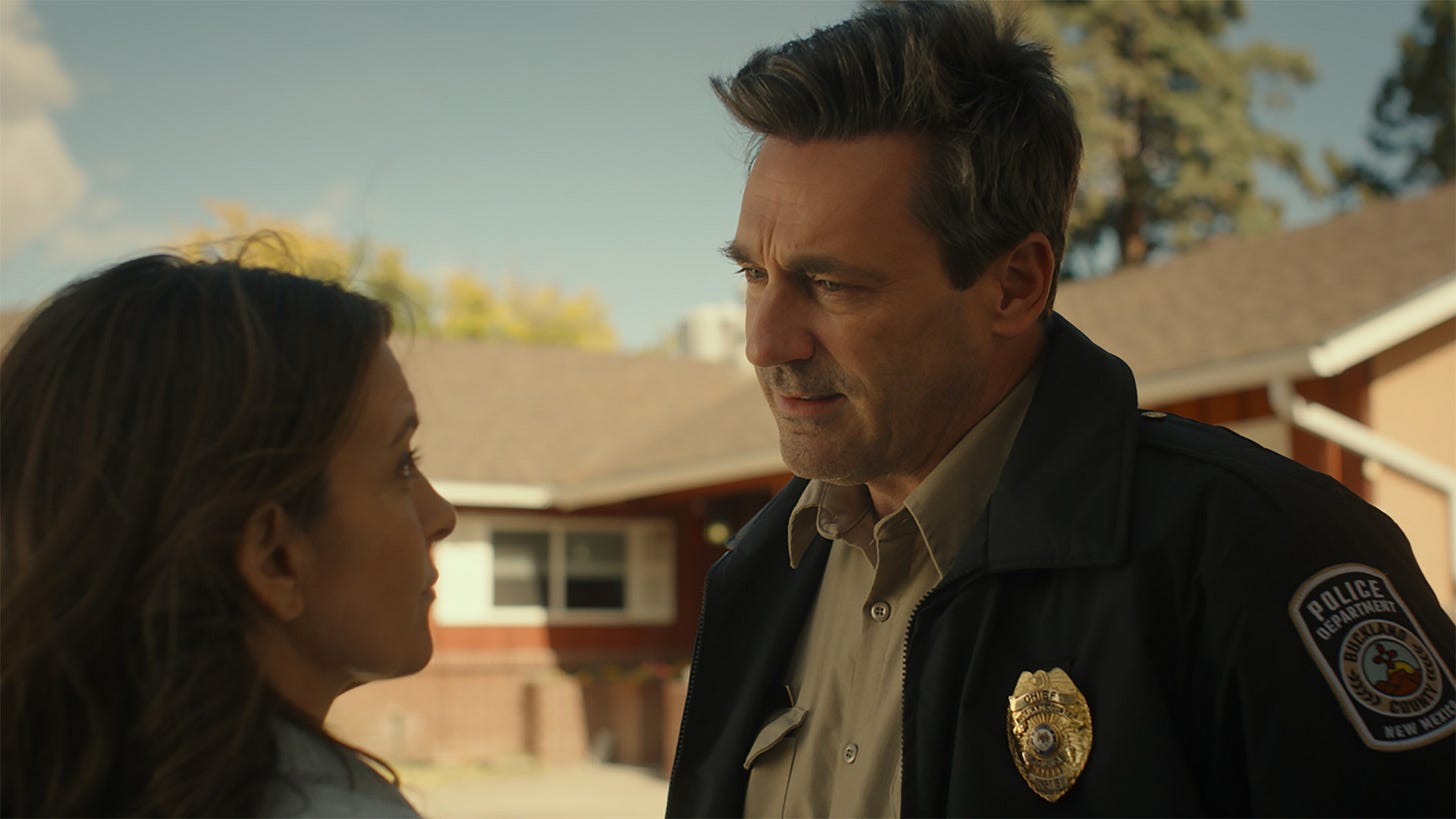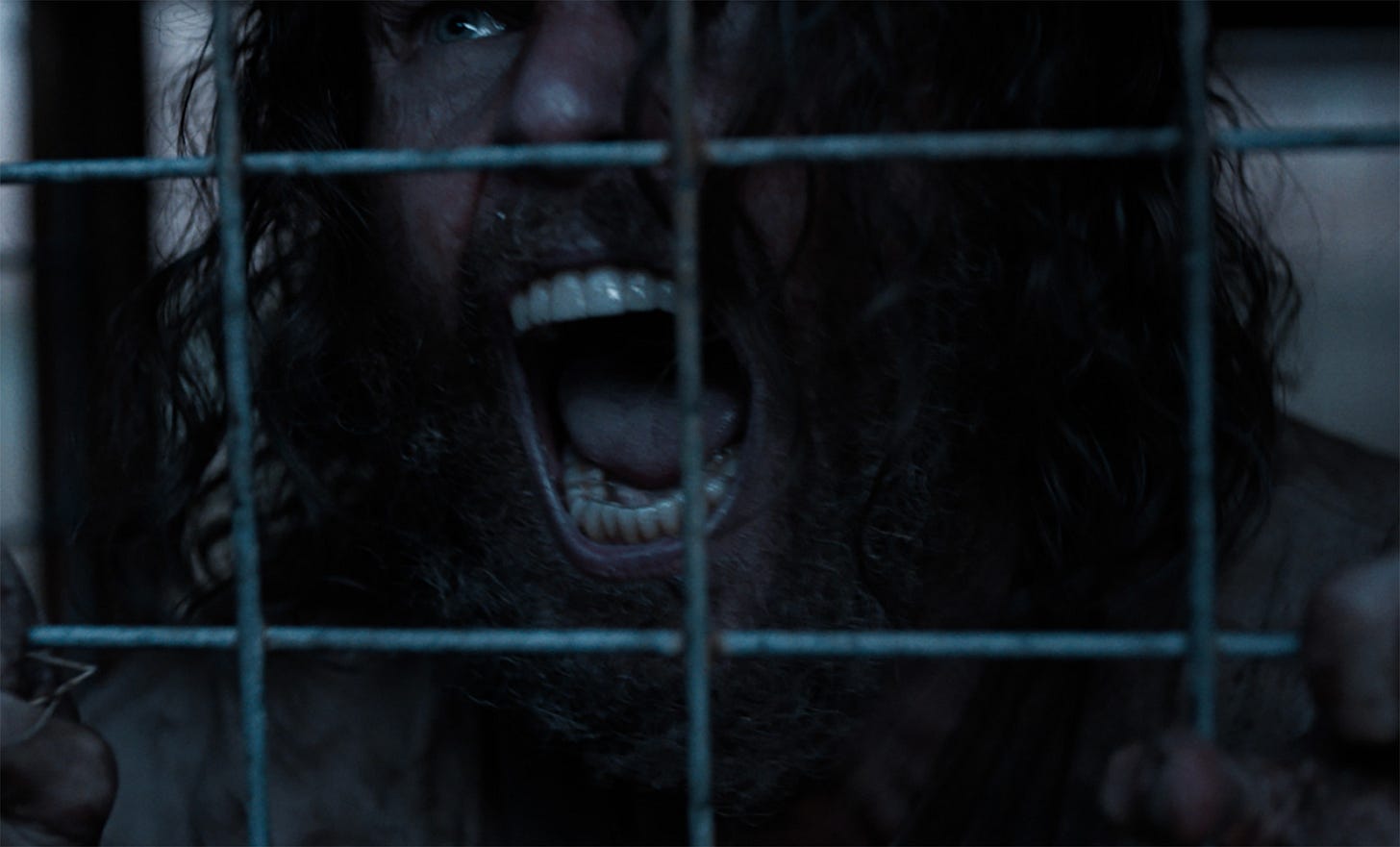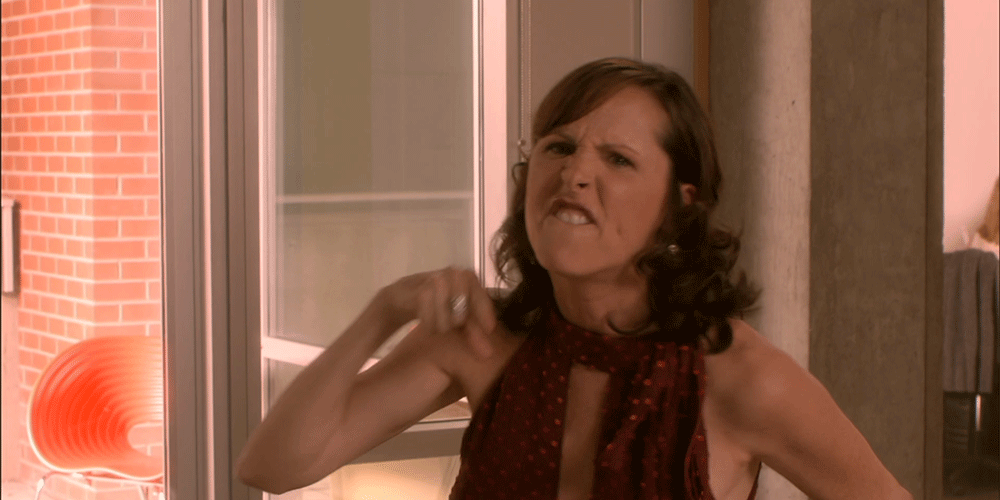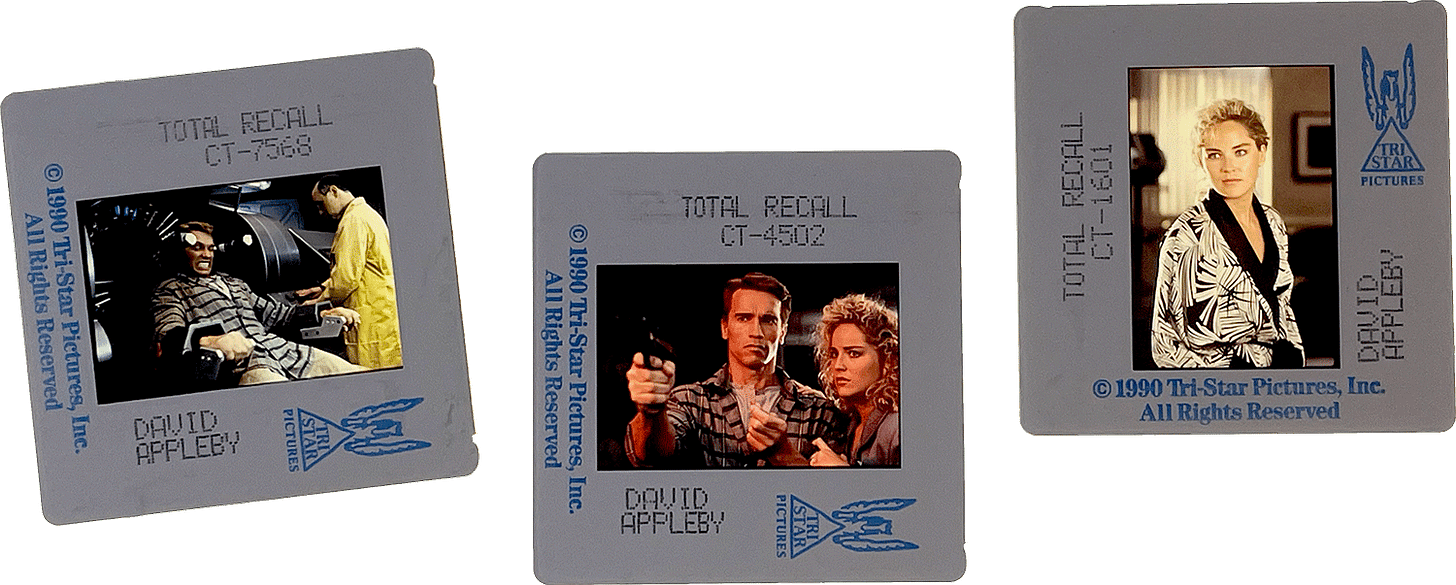Week Ending 6/16/23
Congrats, Vegas Golden Knights!
I’ve been trying to think of something interesting film/tv related to talk about here and there’s absolutely nothing coming to mind. I’m going to blame it on my brain’s confusion as I shift away from Stanley Cup Playoffs to festival season. Not having a game to watch every night of the week is going to provide a lot of time to watch screeners, but I’m honestly thinking the pace I’ve been going at is enough. I don’t want to burn out like I did last year.
Maybe that means visiting older stuff or revisiting favorites I haven’t had the time to fit in because I’ve been on the new release grind for a decade and a half. I’d still love to try and watch at least one Criterion film every week too to eat into the list of classics I’ve egregiously neglected my entire life. It’s just always easier to wish than to actually do.
What I Watched:
FROM: Season 2
(streaming on MGM+)
The first season of John Griffin’s FROM ends with new developments that expand its mysterious world beyond mere nightmare. Up until that point the unwitting residents of this impossible town devoid of an exit besides death only had to combat the reality that monsters lived in the woods. It wasn’t an ideal situation, but, as Sheriff Boyd’s (Harold Perrineau) chalkboard stated at the series’ start, it was manageable. They had gone three months without a casualty when the Matthews family arrived in their RV as part of an infamous “two-car event” that hadn’t been seen in decades. As long as you stayed indoors with a talisman hanging, those human-adjacent creatures couldn’t attack. As time went by, however, voices and visions began to corrupt in ways that were breaking down the idea of community Boyd and Colony House’s Donna (Elizabeth Saunders) instilled.
It’s those voices and visions that Griffin pivots towards for season two—and rightfully so. You cannot create a puzzle box like this without progressing the bigger picture rapidly enough to keep your audience invested. While doing so by way of a voice on Jim (Eion Bailey) and Jade’s (David Alpay) radio presenting the idea that they are all being watched and the escalating terrors of Boyd’s journey into the deep forest revealing even worse nightmares to come does help viewers to dig in and clamor for more, it also unfortunately renders the original horrors quaint and inconsequential. Because the more we move towards conspiracy theories and dream, the farther away we get from the more urgent brutality outside the characters’ windows. Don’t therefore expect nearly as many deaths this time around. Where season one leveraged its sprawling cast into shocking farewells, season two is much more interested in lore.
Some of you will probably check out as a result. I did too for a spell. You watch that charter bus pull into the diner’s parking lot at the end of “Oh, the Places We'll Go” and you anticipate an influx of new people marked for death (besides the obvious “twist” that seeing “Grand Rapids” conjures a couple episodes after learning it’s where Chloe Van Landschoot’s Kristi came from). So, when the initial onslaught of chaos subsides (that many people arriving at once so close to dark guarantees a feast for the monsters since Boyd and company have a difficult time explaining this town to one new person let alone twenty), the season turns somewhat bloodless. Injuries replace eviscerations and the stakes seem to be lowered as Griffin (and Jeff Pinkner, who earns a co-story credit on most if not all episodes) looks to turn our attention to the inward psychology of his characters. What did Boyd see and what did he bring back? What does the voice Jim heard reveal? And who are the children haunting Tabitha (Catalina Sandino Moreno) after an adventure through the caves where the monsters sleep?
It’s a lot to juggle and it can get frustrating to parse since so much of what happens this season does so in a vacuum. I found myself yelling at the TV for Boyd and Tabitha to talk at least once and realize their experiences were connected (although doing so might have put a wrinkle in the cliffhanger that ends “Once Upon a Time”). Then there’s newcomers like Nathan D. Simmons’ Elgin and A.J. Simmons’ Randall feeling very unnatural as one-dimensional plot progressors, the former being saddled with a dream he can’t quite remember and the latter a stubborn malice that manipulates lead characters onto a path that adds very little to the overall mythos. Whereas Boyd and Tabitha’s journeys hold weight, everything else that happens proves to be a distraction. It merely gives Jim, Julie (Hannah Cheramy), Kristi, and Kenny (Ricky He) something to keep themselves occupied with in the meantime. Thankfully, Donna and Victor (Scott McCord) are allowed some meaningful character development within those fringes.
To me, Saunders and McCord are the MVPs of this season. Donna’s present actions and Victor’s memories of the past are the glue that hold everything together. They are the most intriguing and complex characters on-screen because they are the most emotionally volatile and that vulnerability really adds something that Kenny’s (justified) indignation and Boyd’s guilt (Harold Perrineau is still great) can’t. I don’t think it’s a coincidence that Donna and Victor are also the only two people in this town that have truly accepted the fact that it is their home now. They’re the only ones who refuse to let hope dictate their actions because they’ve seen how quickly it can die. It’s why they’re the perfect foils to Boyd and Tabitha respectively. They can push those “heroes” where they need to go with vinegar and fear respectively. Donna allows Boyd to be calm. Victor allows Tabitha to be brave.
A lot of crucial mythology is therefore revealed even if most of what happens exists as filler distraction or fodder for fateful epiphanies. The big looming danger marked by a creepy music box falls prey to that role too, but at least its origins open some doors for the future. It’s about five episodes worth of plot development spread over ten episodes that sustains itself because of the characters. And since this whole thing hinges on those characters keeping their heads despite insane circumstances, that does prove enough. At least for now. Because while the ending cliffhanger is a doozy, so too was the one that concluded season one. Hopefully Griffin can reclaim the sense of urgency he lost when bringing the ramifications of that first surprise into the fold. That he can bring the plot threads back together and stop being afraid to sacrifice his series regulars because none of the season two deaths hold any weight. Everything that occurs is a means to an end. And while I can deal with that for a season, I’m not sure I can for two.
- 6/10
THE FUTURE
(premiered at Tribeca)
Yafa (Samar Qupty) shouldn’t have been able to assassinate Israel’s Minister of Space and Tourism. Not because security should have stopped her or because she shouldn’t have been able to pull the trigger, but because the not quite real world on-screen should have known she would. That’s what the government pays Dr. Nurit Bloch (Reymonde Amsellem) to do, after all. They fund her research to perfect an algorithm that’s able to mine the population's data and compare it to the historical markers of terrorist acts. So, she of course wants to meet with Yafa and find out what went wrong. Was it the program? Had Yafa somehow tricked the system? Or, as we easily assume and she eventually discovers, was it the premise behind predicting the future itself? The word “terrorist” says it all since Yafa considers her act to be one of Palestinian “resistance” instead. Nurit’s presumptions have created a blind spot.
What starts with the desire to fix the algorithm ultimately becomes Nurit reevaluating her engagement with the world around her. Because she can’t go back. She can’t make tweaks and keep repeating things until Yafa fails. Noam Kaplan’s THE FUTURE is therefore actually a film about the present despite its title. It seeks to reconcile a subjective past with a hypothetical future by shaking Nurit awake to truly see what’s happening in the here and now. Her past defined a rigid, clinical outlook on human behavior that makes it possible to imagine a future of controlled peace. The safety and comfort of opportunity provided her a template from which she could create that utopia. It was her purpose. It was her right. To rid her nation of its ills. Prevent its enemies from ruining its home without ever thinking deep enough to remember that it had to ruin theirs first.
Yafa is her polar opposite as a result. Rather than resent her mother, she loves her. Rather than live with the notion of having a future, she’s long since accepted a fate where one wasn’t guaranteed. That’s what it is to live under occupation. There’s no room to dream. So, Nurit can’t simply provide a laundry list of friends turned “accomplices” and expect regret. Yafa didn’t recruit those who unwittingly helped her. Their actions didn’t possess intent. When Yafa’s reply to Nurit telling her that she should be ashamed of using these men who will now go to prison is to turn the table and explain how it was actually Israel’s fault for choosing to project the blame upon them as a means for revenge, you can see that this interrogation is going nowhere. Because it isn’t Yafa that has something to hide. It’s Nurit. The only thing the latter can therefore hope to learn about is the breadth of her own privilege.
Kaplan builds this gradual understanding on the backs of multiple metaphors. The backdrop is Israel launching a shuttle to the moon (another example of colonization/occupation). Nurit is interviewing a potential surrogate to carry hers and her husband’s baby (a life overseen by a stranger with the power to dictate whether it lives or dies). There’s the warmth and love of Yafa wanting to see her mother opposite the disinterested obligation of Nurit’s interactions with her own. An Arab herb flourishing in a Jewish garden and a joke about Jewish women only needing a man to “buy them an Arab’s house.” The messaging is clear, but it’s never so overt that it ruins the authenticity of the dialogue being shared. This is a world dictated by science and driven by conquest that cannot understand why a promising young woman could throw her life away because it refuses to understand that becoming a murderer was the only job it allowed her to have.
- 7/10
I’M A VIRGO: Season 1
(streaming on Prime starting 6/23)
If you thought Boots Riley’s absurdist, anti-capitalist screed SORRY TO BOTHER YOU was wild, you haven’t seen anything yet. The writer/director takes those same ideas and retools them into a critique set through the lens of superhero copaganda by manufacturing a character that cannot escape the pro-capitalist indoctrination television and comic books have a way of instilling within a for-profit world of consumer-driven desire. This brainwashed soul is named Cootie (Jharrel Jerome) and he is nineteen years old and thirteen-feet-tall. Raised by his uncle and aunt (Mike Epps’ Martisse and Carmen Ejogo’s LaFrancine) in Oakland, Cootie has never seen the outside world except through a periscope so as not to be seen and inevitably studied, feared, and killed. So, his only interpretation of what awaits him beyond his four walls comes from the filter of agenda-driven entertainment/media. To him, all you have to do is dream to find happiness. But “working hard” and “behaving” according to the system’s rules actually just makes you complicit to its intentional pursuit of inequality.
Riley is commenting on everything from celebrity culture, exploitation, religion, unionization, for-profit healthcare, toxic masculinity, disability, sex, and love through seven jam-packed episodes depicting Cootie’s crash course in the “American Way.” You have his parents on one shoulder saying he’s not ready to confront a society that’s historically shown itself to be violent towards the “other” and his new friends (Brett Gray’s Felix, Kara Young’s Jones, and Allius Barnes’ Scat) on the other using exposure therapy to make up for all the lost time via alcohol, dance clubs, and the hallowed juicy goodness of fast food burgers. Then there’s the potential love interest standing in front of him (Olivia Washington’s Flora, an intriguing and empowering interpretation of autism) imploring him to embrace who he is outside the noise and a so-called savior (Walton Goggins’ self-deluded The Hero) behind him with a gun against his head despite Cootie believing he’s merely there to offer a pair of hands to catch him if he falls.
It’s a lot to juggle. Some of it doesn’t land as effectively as I’m sure Riley hopes. Some hits you over the head with a sledgehammer of soap-box oration to ensure there’s no way you can miss the point. And most hits that sweet spot of insightful metaphor and absurd satire that makes the whole such a joy to experience. As such, it’s practically impossible to grasp every little thing that’s happening without repeated viewings since there’s very rarely any time to take a breath let alone fully comprehend what’s going on in the foreground without also being aware how what’s occurring in the background is just as crucial to the bigger picture. Expand that truth out further and know that many of the odd twists and turns from the opening episodes will change context and purpose thanks to new revelations in later episodes. Never therefore assume anything. Because Riley’s whole point here is to prove that you’re wrong. That even the most cynical of us is still unwittingly being ruled by a lie that says things can change.
I can’t wait to see the think pieces that will come out in the next few months. The hyper-specific reads on Cootie’s parents doing more harm than good or the positives and negatives of Jones’ patient politics or the thin line between heroism and villainy by way of “heroes” being ignorant to their own oppression. There’s going to be a lot of discourse around the Adult Swim-esque nature of Scats’ favorite cartoon “Parking Tickets” and the unforgettably hilarious logistics of an average-sized human having sex with a giant too. Some will center on the superficial escapist comedy of it all while others will mine down deeper to reveal the psychological effects of subliminal messaging and deprogramming respectively. Because nothing on-screen is purely just for fun. Rewatch SORRY TO BOTHER YOU to remember how exacting Riley is and how effectively he overloads our senses to ensure his themes are injected straight into our DNA.
I’d love to think it will connect with enough people to keep going because there’s a ton of unanswered questions: Cootie’s parentage, a rapidly worsening rash, a silent ghost, and a shift into pure fantasy by way of practical superpowers (public speaking) and unexplained phenomenon (if you’re leaning into notions of giants, Lilliputians aren’t out of the question). I’m sure the capitalist system it critiques is going to play a huge role in any decision on a second season too since budget can kill anything regardless of legitimate concerns or the fickle whims of its benefactor. Because even if the brilliant use of practical effects here is cheaper than CGI, time is also money. Thankfully, as the finale “Cellphone on a Headband” proves with its climax, the potency of lo-fi DIY visuals is married to the message they’re used to illustrate. And despite the ingenuity of Cootie’s scale, he’s actually sidelined from some of the show’s best moments (see Scat’s journey at the end of “Paco Rabanne”). I’M A VIRGO isn’t as much about him as it is you and me peering through his eyes at the truth of everything we’ve been trained to ignore.
- 8/10
MAGGIE MOORE(S)
(premiered at Tribeca; now in limited release and on Digital HD)
It opens with a murder. We don’t know who the victim is nor why the killer chases after her onto a motel balcony. We know nothing about anything until a cop comes to tell Police Chief Jordan Sanders (Jon Hamm) the deceased’s name was Maggie Moore (Mary Holland)—a revelation that takes him and his deputy (Nick Mohammed’s Reddy) aback. Why? Well, that’s when director John Slattery hits rewind to bring MAGGIE MOORE(S) backwards ten days. It’s then that Jay Moore (Micah Stock) got into a criminal pickle with a pedophile (Derek Basco’s Tommy T), a deaf hitman (Happy Anderson’s Kosco), and his wife, another Maggie Moore (Louisa Krause). Suffice it to say, screenwriter Paul Bernbaum delivers two bodies for the price of one to make Sanders wonder if the first Maggie was an accident en route to killing the second or if the second Maggie was a ploy to cover-up the first.
But here’s the thing. We know which it is. The murders aren’t therefore the central intrigue despite being the premise of the entire film. No, the reason we’re made to watch is to discover whether Sanders figures it out. If that sounds counterintuitive to you, know that it feels counterintuitive too. By giving us everything to then force us to watch whether the police are keen enough to crack the case rips every shred of momentum away. There’s no internal clock because there’s no real threat of hurting anyone that matters … namely because no one else on-screen really does matter. With both Maggies dead by the fifteen-minute mark and both widowers wholly unsympathetic either by guilt or sheer disgust, Sanders and Reddy are it. Maybe they’ll get killed in the line of fire. Maybe they’ll get embarrassed by never solving the case. Or maybe things will be so boring that they’ll think they solved it, never discover they haven’t, and leave us knowing the truth.
The result is a frustrating adventure chock full of comic foibles since Jay is an idiot and his rapport with the conversely calculating Kosco is ripe with effective if misguided humor. Bernbaum decides to inject a romantic interest for Sanders to spice things up via Jay’s neighbor Rita (Tina Fey)—and, admittedly, this subplot is the best part of the entire movie right up until it hits an abrupt wall that clumsily and reductively attempts to mine their broken souls’ psychological baggage while actually just setting up a convoluted climax—but it’s so disparate from the police procedural that it becomes like we’re watching two different films at once. If not for the first two-thirds of the romance and last third of the mystery (which finally delivers a few surprises at the eleventh hour), I’d say the whole enterprise was a dismal failure and waste of quality talent. Because of them, MAGGIE MOORE(S) scrapes by to merely prove a disappointingly forgettable lark.
- 5/10
THE SEEDING
(premiered at Tribeca)
It’s a simple concept: seeds are nothing without fertile land in which to grow, land that is made fertile by death. Push out from the science and into the visceral horror of what that means in a cruel world populated by humans at their most depraved and you get Barnaby Clay’s THE SEEDING. As such, it’s not necessarily surprising how things unfold. The title kind of puts the idea behind the truth of Wyndham Stone’s (Scott Haze) desert cavern prison into focus straight away. The question is therefore less about whether he might survive his ordeal and more about the complicity of his cellmate Alina (Kate Lyn Sheil). Because her position as “mother” in this wasteland could have been won in two ways. Out of necessity or duty. Deciding which is worse proves a bit of a litmus test. Do you want her to be a pawn forced to give birth to the strays that become her captors? Or a monster pulling their sadistic strings?
Is the core conceit misogynistic as a result? I’m not sure. To hear Clay talk about the origins of his film is to learn he came up with it while walking through the desert with his pregnant wife. He explains how the act of giving birth is a brutal experience and how the father becomes little more than an appendage watching and waiting, helpless and disposable after conception. So, I think the depiction on-screen is less about making this woman a victim of rape or a monster and more about exposing his own insecurities and vulnerabilities as a bystander to the process of creating life. To witness Wyndham’s slow descent towards insanity as his selfishness, indifference, and desire for control are chipped away is to see a father coming to grips with the reality that he has no real power. Will he accept his role or fight against it? Will he choose to remain or escape?
To say the violence on-screen is a very personal metaphor for the filmmaker seems strange, but here we are. Clay has taken the concept of childbirth to its extreme by way of feral boys serving the process and unsuspecting men trapped to maintain it. I’m not therefore sure there’s much in the way of depth considering the theme itself is so overtly drawn. Beyond it is a survival nightmare steeped in intentionally cryptic rituals via unknown (and unexplained) languages and traditions. THE SEEDING’s success is thus dictated by how well you believe Wyndham’s defiance works in the face of Alina’s compliance. The whole is mostly two characters in close quarters reacting to their dark fate while their jailers hoot and holler above. Even the repetition of opportunities for Wyndham to choose captivity seem fruitless after a line of dialogue explains his purpose was set the moment he arrived. If that choice isn’t legitimized, it’s all empty, if effective, terror.
- 6/10
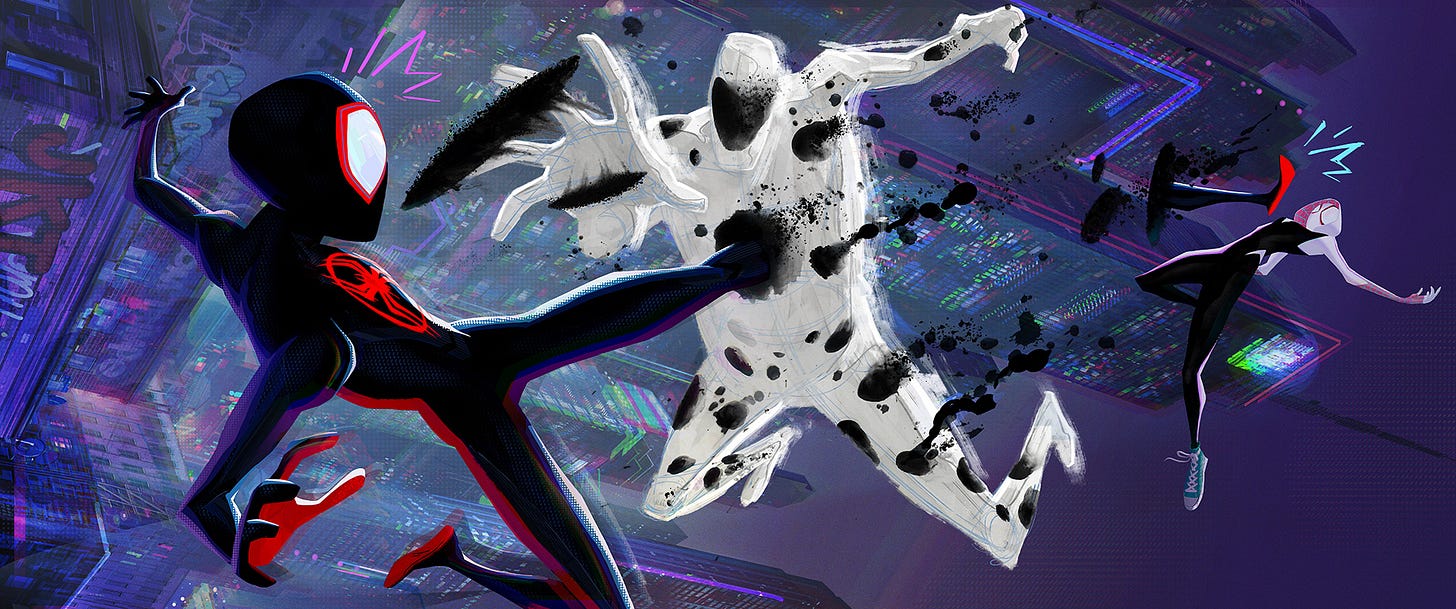
SPIDER-MAN: ACROSS THE SPIDER-VERSE
(now in theaters)
The hope at the end of SPIDER-MAN: INTO THE SPIDER-VERSE was that destroying Kingpin’s super collider would wrap things up with a tidy bow. And for a little more than a year, things seemed to have died down accordingly—at least on Miles Morales’ (Shameik Moore) Earth. Since we don’t know exactly how many times Doc Ock tested the device and thus how long its rifts stayed open, we cannot begin to guess the ramifications on everyone else’s world. Nor can we ignore the reality that someone figuring out a way to portal between universes on one Earth all but guarantees someone else figured it out on another. So, we shouldn’t be surprised when SPIDER-MAN: ACROSS THE SPIDER-VERSE opens on Gwen Stacy (Hailee Steinfeld) needing to subdue an anomaly of her own by way of a Renaissance-era drawing of Vulture (Jorma Taccone) or that she receives help from yet more Spidey-sensing versions of herself.
It’s the perfect reintroduction to this world by writers Dave Callaham, Phil Lord, and Christopher Miller. Rather than go straight back to Miles, they give Gwen her own prologue to set-up her world (a gorgeous watercolor mood ring of changing pinks and purples), origins (the unknown circumstances surrounding the known death of her Peter Parker), and family (Shea Whigham’s Spider-Woman-hating police captain George). Because we need to see that she’s struggling with the same issues facing Miles so that the idea that they are “the same” shines through more than just as a means to a potentially romantic end. The choices that Miles will soon have to make are the same ones she is making now and being “the same” doesn’t necessarily mean the context behind that sameness won’t lead them to different answers. The simple fact that Miguel O’Hara (Oscar Isaac) approaches Gwen first demands it since she won’t have the benefit of a trusted friend’s ear before deciding.
O’Hara is more-or-less offering a job if not an adoptive universe hopping family of like-minded souls in pursuit of one goal: sending all anomalies back to their birth worlds and maintaining each world’s “canon” timeline as a result. The way he and second-in-command Jessica Drew (Issa Rae) explain it is pretty cut-and-dry on the surface. Capture out-of-place baddies like Vulture and stop them from screwing with fate. Unfortunately, villains killing people who shouldn’t be killed is only one side of that coin when you consider O’Hara’s team also becomes an anomaly in pursuit of that quest. What then happens if they save people who shouldn’t be saved? Where is the line? Is there a line? We’re talking butterfly effect to the nth degree since you cannot know what you might do in service of stopping figures you cannot control. And when you do decide to find out—to consciously become aware of who is allowed to live and die—it shouldn’t take long before you’re questioning whether you’ve stopped being the hero you thought you were.
It’s a heavy psychology litmus test wherein those who are supposed to risk everything to save one life in the gray areas of existence have suddenly adopted an inflexible black or white code of utilitarian conduct. It’s hardly a new concept in the realm of superheroes, but very little is these days. Where ACROSS THE SPIDER-VERSE excels is therefore in the authentic evolutions of those forced to reconcile the two lines of thinking and how that which seems intellectually sound may not be emotionally so. Do you let your heart take over? Can you steel yourself to the tragedies that will ensue when choosing your mind? And where does the pressure of conformity come in? How about legacy and experience? Because who are Miles and Gwen in comparison to Miguel, Jessica, and the other hardened and wise Spideys bouncing around the multiverse? Will they have the courage to speak their truth in opposition of their elders? What about acting on it too?
The stakes are appropriately high from the start in service of these questions. They have to be when you consider the push and pull of dealing with the isolation of being a friendly neighborhood Spider-Person and the longing for what could be if only Miles and Gwen had each other too. We’re talking about getting pushed into corners that make them want to tell their parents who they really are. Or choosing to forsake their pasts for a future alongside O’Hara without fully grasping that doing so will only be avoiding the real issues at-hand. Callaham, Lord, and Miller are doing so many great things with character development here that you would be forgiven for forgetting there is a supervillain in the middle of the chaos. And that’s not without intent since Spot (Jason Schwartzman) is hardly a formidable foe as much as he is a slippery one. But while Miles and Gwen solidify their motives and open their eyes to the bigger picture, Spot is consolidating power to become something they may not be able to defeat.
That’s for BEYOND THE SPIDER-VERSE to handle, though. This is very much a “part two,” complete with cliffhanger—a conscious choice once the script ballooned to the point of needing over four hours to do it justice. The battles here are more internal. Finding personal strength to be who you think the world needs rather than the person the world thinks it needs (it’s all those police parents hating their vigilante kids for daring to color outside the lines extrapolated onto a macro scale). And while Miles and Gwen wrestle with it, directors Joaquim Dos Santos, Kemp Powers, and Justin K. Thompson facilitate an absolutely gorgeous display of animation. Because it’s one thing to bring multiple aesthetic into Miles’ atmosphere, but another to bring multiple aesthetics into multiple worlds. See Daniel Kaluuya’s punk Hobie Brown (a rendering nightmare of 2D cutouts pasted together like old Sex Pistol album covers) dropped into Pavitr Prabhakar’s (Karan Soni) colorfully unique Indian Mumbattan for the craziest mix.
Between the disparate styles co-existing inside wildly different settings that ooze culture, nostalgia, postmodern technique, and/or all the above and the breakneck, entertainingly constructed action sequences, you’d be having the time of your life even if the filmmakers decided to phone the plot in. That they didn’t results in a dense work that stimulates the senses more than even INTO THE SPIDER-VERSE could. Add a slew of Spidey lore Easter eggs that prove how little I know about the character beyond the Hollywood films and you can understand why so many people are seeing it multiple times. I personally can’t wait to get it for home viewing to pause frame by frame and soak in the detail since there’s simply too much happening to catch it all at once. How that truth doesn’t render it an over-saturated jumble of a mess is a testament to the craft because the visuals are always legible. Every composition measured to perfection. I’m almost scared to hope BEYOND can match its brilliance.
- 9/10
Cinematic F-Bombs:
This week saw THE EX (2007), GRACE IS GONE (2007), GRAY MATTERS (2007), JUNO (2007), and TRANSFORMERS: AGE OF EXTINCTION (2014) added to the archive. Got a Transformers movie into the collection on the heels of the latest installment in the franchise hitting theaters. Once I get access to a downloadable copy of DARK OF THE MOON and REVENGE OF THE FALLEN, I’ll add them too. Anyone know if RISE OF THE BEASTS includes an f-bomb? cinematicfbombs.com
New Releases This Week:
(Review links where applicable)
Opening Buffalo-area theaters 6/16/23 -
ADIPURUSH at Regal Elmwood & Galleria
THE BLACKENING at Dipson Capitol; AMC Maple Ridge & Market Arcade; Regal Elmwood, Transit, Galleria & Quaker
“Oliver and Perkins throw the kitchen sink of horror tropes and Black stereotypes into the blender, overlapping categories whenever possible to craft memorable laughs and effective scares since Story shoots it all like a bona fide slasher.” – Full thoughts at The Film Stage.
DALILAND at North Park Theatre (select times)
ELEMENTAL at Dipson Mckinley, Flix & Capitol; AMC Maple Ridge & Market Arcade; Regal Elmwood, Transit, Galleria & Quaker
EXHIBITION ON SCREEN: TOKYO STORIES at North Park Theatre (select times)
THE FLASH at Dipson Amherst, Mckinley, Flix & Capitol; AMC Maple Ridge & Market Arcade; Regal Elmwood, Transit, Galleria & Quaker
SCARLET at North Park Theatre (select times)
Streaming from 6/16/23 -
BLACK CLOVER: SWORD OF THE WIZARD KING - Netflix on 6/16
CHEVALIER - Hulu on 6/16
“For all the verve of that opening sequence and style of an equally powerful final few showstoppers, the middle portion can feel pedestrian by comparison, yet effective thanks to Harrison Jr.'s fantastic lead performance.” – Full thoughts on The Film Stage.
EXTRACTION 2 - Netflix on 6/16
STAN LEE - Disney+ on 6/16
JOHN EARLY: NOW MORE THAN EVER - Max on 6/17
TAKE CARE OF MAYA - Netflix on 6/19
GODLAND - Criterion Channel on 6/20
THE STROLL - Max on 6/21
Now on VOD/Digital HD -
BEAU IS AFRAID (6/13)
CINEMA SABAYA (6/13)
“The purpose isn't therefore to magically solve centuries of persecution. It's to remind us that no one is perfect. No one is unequivocally correct. And no one is truly alone.” – Full thoughts at HHYS.
FALCON LAKE (6/13)
“You could say the real ghost is love itself. That invigorating sense of inclusion and fullness that can so easily and unexpectedly disappear, haunting those who've lost it.” – Full thoughts at HHYS.
HORSEPLAY (6/13)
HOW TO BE A GOOD WIFE (6/13)
INFINITY POOL UNCUT (6/13)
NAM JUNE PAIK: MOON IS THE OLDEST TV (6/13)
TOMMY GUNS (6/13)
ABOUT MY FATHER (6/16)
MAGGIE MOORE(S) (6/16)
Thoughts are above.
MIDDAY BLACK MIDNIGHT BLUE (6/16)
THE WRATH OF BECKY (6/16)



